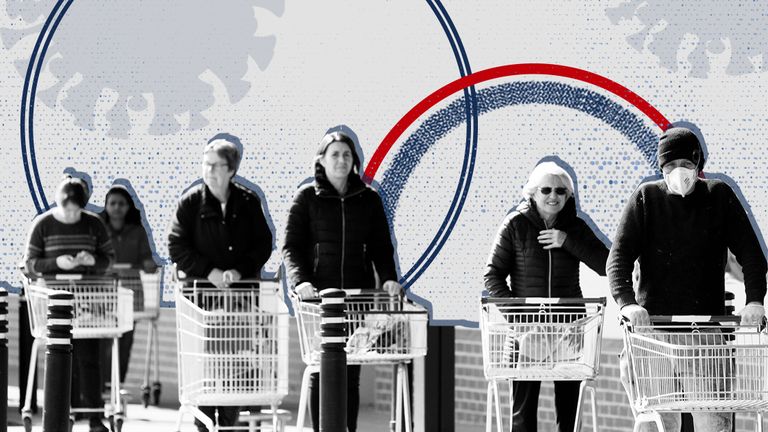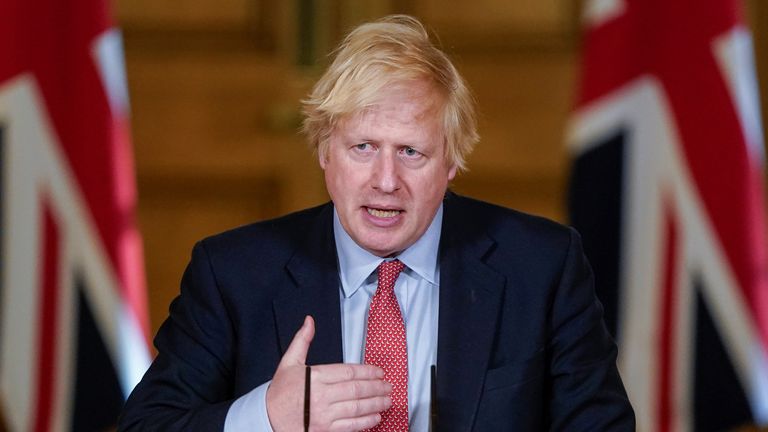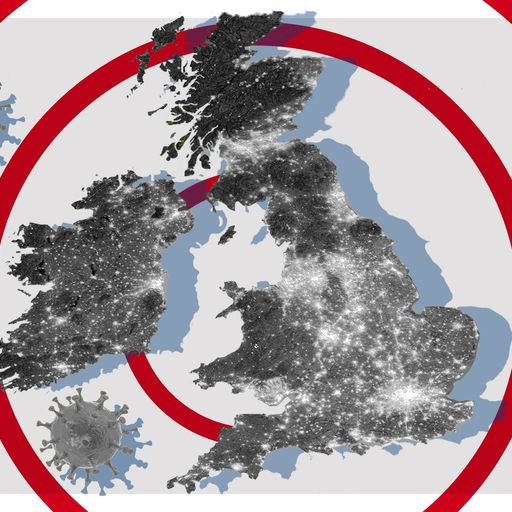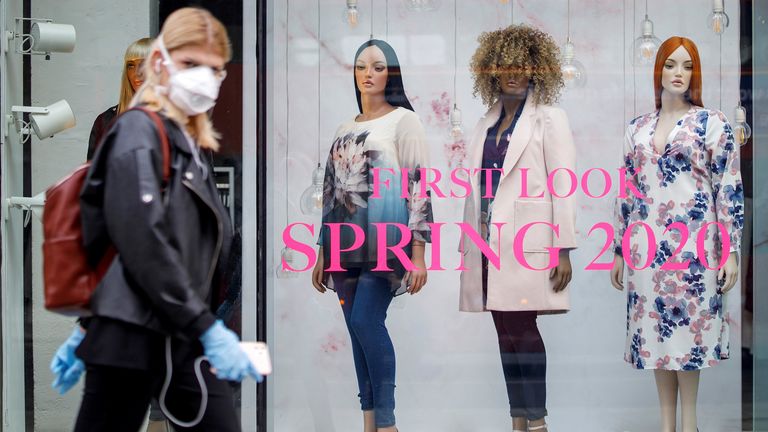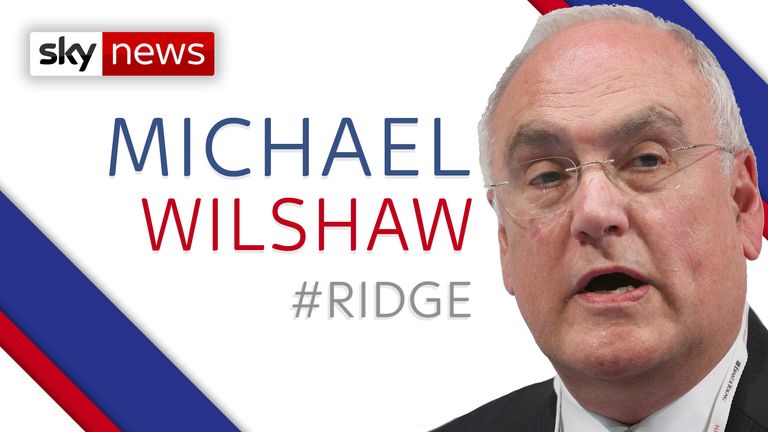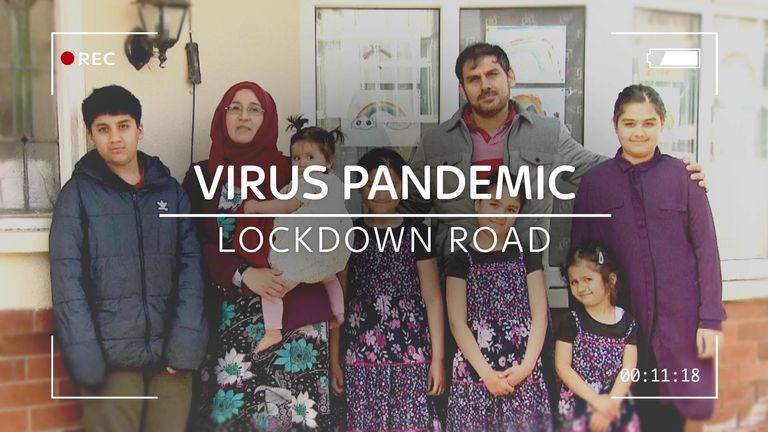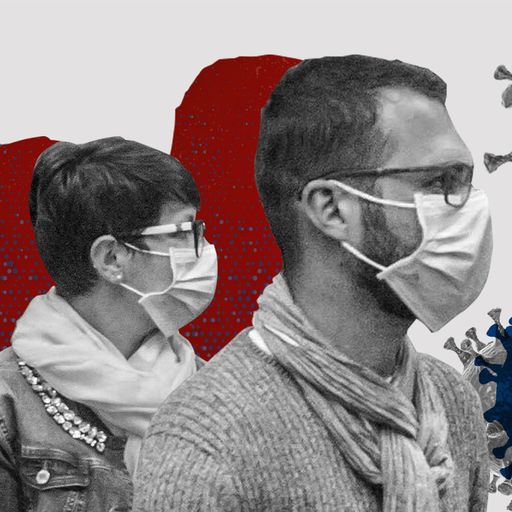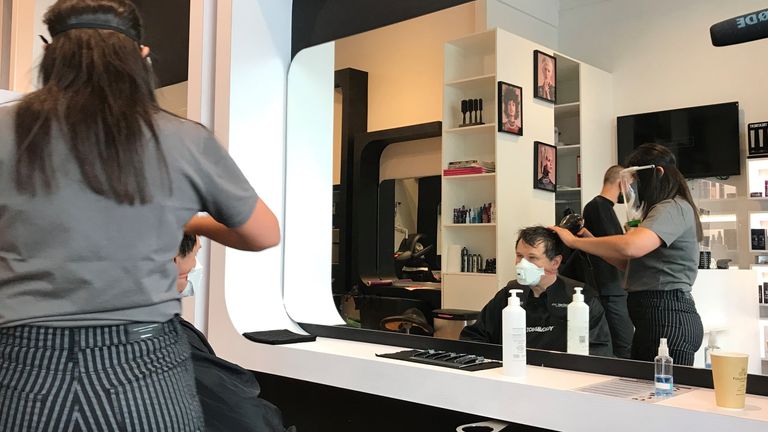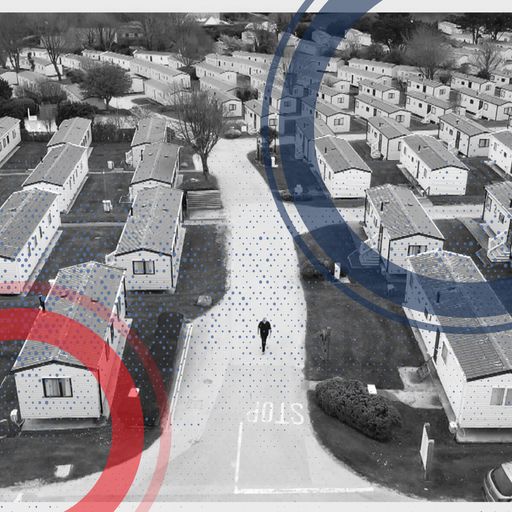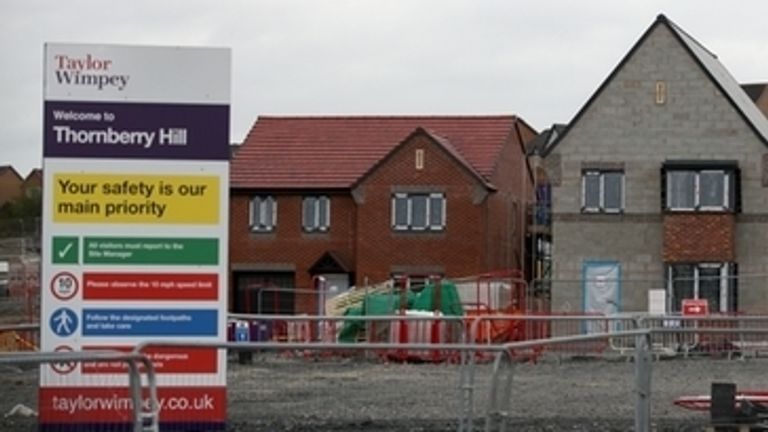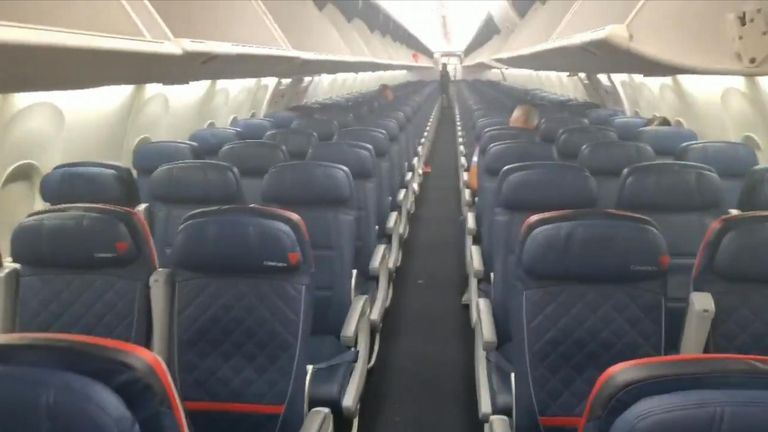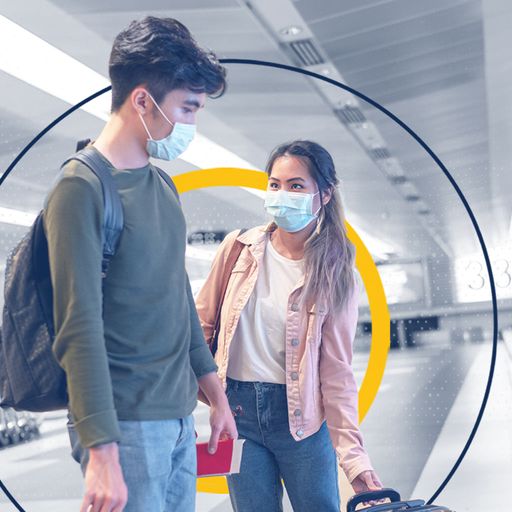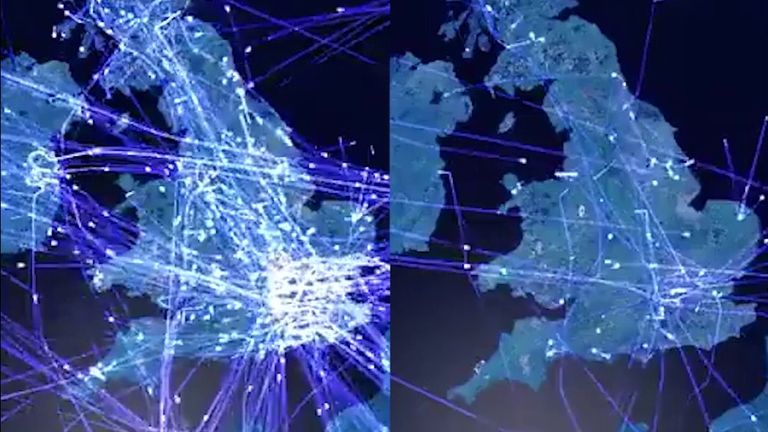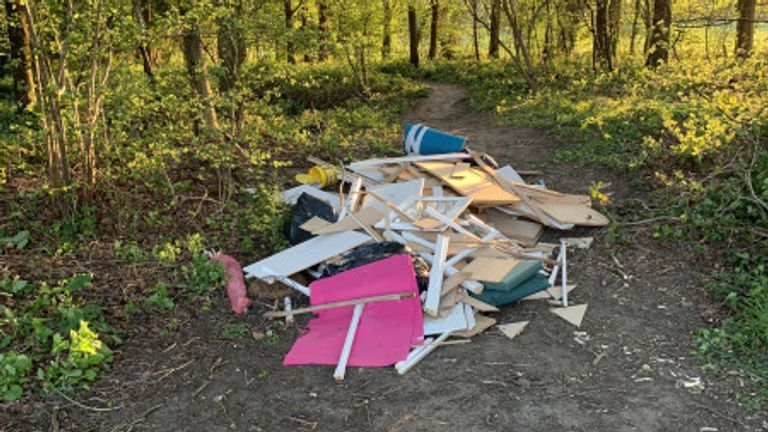Coronavirus: 'The new normal' - What life might look like in the near future
Tuesday 26 May 2020 16:04, UK
Prime Minister Boris Johnson has drawn up a roadmap for easing the lockdown in England - but Downing Street has stressed "it is not going to be a case of flicking a switch" to lift all restrictions at once.
People will have to get used to a "new normal" due to coronavirus, with social distancing measures set to remain in place for "some time", Foreign Secretary Dominic Raab has said.
But what might that "new normal" look like?
Shops and non-essential businesses
Although garden centres have already reopened in England and Wales, other outdoor retail spaces will be permitted to open their doors from 1 June in England.
Other non-essential retailers can open from 15 June in England.
Both these store types will follow the same social distancing and hygiene measures as seen in supermarkets, which have remained open throughout the COVID-19 crisis.
This includes 2m queues, one-way systems, the use of personal protective equipment (PPE) as well as plastic screens at tills to ensure there is no physical contact between staff and shoppers.
The British Retail Consortium has advised retailers to consider closing and restricting access to toilets and changing rooms.
Other measures include separate entrances and exits, discouraging cash payments and increased cleaning and hygiene habits.
One option suggested by the government is the use of "fixed teams" or "partnering". This is the practise of reducing the number of people each person has contact with, so each person works with only a few others.
Another step is encouraging staggered breaks at work.
Factories
For factories and warehouses, the only people on site will be those who are unable to do their work from home.
For example, office staff will likely continue to work remotely, while others return and work under social distancing measures and with protective steps taken, such as freely available hand sanitiser.
As well as protecting those at work, pressure will be put on companies to monitor the wellbeing of staff at home, such as ensuring they do not feel isolated.
Floor layouts will be changed and the number of staff on the premises will be limited to ensure the 2m rule is adhered to. Another option that will be explored will be encouraging people to work side-to-side or back-to-back, as opposed to having people face each other.
Carmakers including Jaguar Land Rover, Aston Martin and Nissan have announced the gradual resumption of production at plants, which will also require physical distancing rules in place.
They could follow in the footsteps of Volkswagen which overhauled its procedures in Germany to include extra hygiene measures. Workers have been told to measure their temperature and get changed into their overalls at home to prevent crowding in factory changing rooms.
Extra markings have been put on the factory floor so that workers are better able to adhere to a 1.5m social distancing rule (although it is likely to remain 2m in the UK), and staff have been given extra time to disinfect their tools and surfaces.
Restaurants, cafes and pubs
Redesigned dining rooms, kitchens and beer gardens may be the way out of the lockdown for customer-facing businesses like pubs, cafes and restaurants, provided they can guarantee customers and staff stick to the 2m social distancing rule.
More and more catering businesses are opening up for takeaway, with the likes of Nandos and McDonald's being some of the bigger names reopening for delivery and drive through.
COVID-19 is a respiratory illness and is not known to be transmitted by exposure to food or food packaging.
Nonetheless, an emphasis is given on increasing the frequency of hand washing and surface cleaning in the government guidance, as well as minimising access to walk-in pantries, fridges and freezers.
Some aspects of working in restaurants, cafes and pubs might mean social distancing guidelines cannot be followed in full and so solutions to mitigate as much risk as possible will need to be found.
A common factor in the catering industry is the use of uniforms worn by staff. Storage and washing could be done by the company, rather than individuals.
Another change that we can expect to become used to is businesses sharing their risk assessments online - the government has said it expects all businesses with more than 50 workers to put theirs on their website and has suggested all businesses share their risk assessment findings with the company's workforce.
Schools
Schools in England are set to partially reopen from 1 June, with the caveat that to do so safely might not be possible for all schools across the country.
This phased return and acknowledgement that schools need to be treated broadly on a case-by-case basis is something that will likely continue as lockdown eases.
Prime Minster Boris Johnson said on 24 May: "This is going to be tough.
"What we will do is make sure that we stagger things, we pace things and we work directly with you, with local authorities, to make sure that there is a plan."
The aim is for schools to reopen by the next academic year in September 2020.
But in the short term, back to school will remain something for those in reception, years one and six, nurseries and other early years providers.
Secondary schools, sixth forms and colleges will then provide "face-to-face contact" from 15 June for Year 10, Year 12 and equivalent further education students aged 16 to 19 to help them prepare for exams next year.
Guidance for schools returning on 1 June include:
• Reducing the size of classes and keeping children in small groups without mixing with others
• Staggered break and lunch times, as well as drop offs and pickups
• Increasing the frequency of cleaning, reducing the used of shared items and utilising
Meeting relatives and friends
Ms Sturgeon has suggested the easing of measures could include the possibility of people joining a social "bubble" containing small groups of friends and family from different households for gatherings, even if that was only possible outdoors.
An immediate first step might be allowing two households to join up together as one such "bubble".
The first non-journalist to ask a question at the government's daily coronavirus briefings, after members of the public were invited to submit questions, was a grandmother wanting to know if she would be allowed to "hug" her family when the lockdown is relaxed.
Lynn, from Skipton in North Yorkshire, said: "I'm missing my grandchildren so much. Please can you let me know if, after the five criteria are met, is being able to hug our closest family one of the first steps out of lockdown?"
Answering the question, chief medical officer for England Professor Chris Whitty said older and vulnerable people may continue to have to be shielded from the virus.
In England, people are allowed to meet up with one person outside of their household in an open space, such as a park. This could be broadened in the future to include meeting in people's gardens - if they have one.
Hair and beauty
Mr Raab told Sky's Kay Burley @ Breakfast earlier this month that salons in England will not be opening until 4 July "at the very earliest".
Some countries like Switzerland and Denmark have allowed hair and beauty salons and tattoo parlours to resume business - but while taking all possible precautions such as wearing a face mask and gloves during treatments.
Hairdressers, barbers and masseurs who come within two metres of customers have been advised to wear masks and transparent plastic face shields, and wash or disinfect their hands before and after each client.
Some similar procedures were already in place at British salons in the early stages of the pandemic, with hand sanitisers made available, hand towels replaced with disposable ones, magazines removed from waiting areas, and all gowns, towels, styling stations, hairdressing tools, chairs, tills, door handles and handrails deep cleaned after every use.
Thorough cleaning and shift work were key to reopening, Denmark's business minister Simon Kollerup said, adding: "It goes without saying that you cannot avoid contact with a masseur or hairdresser. But the new guidelines need to reduce our infection."
Sky News correspondent Adam Parsons had his hair cut in Brussels as the lockdown eased slightly, reminding him of how quickly the norm has changed - including having to wear a mask, wearing a disinfected gown and his hairdresser wearing a visor.
Dentists, opticians, vets and GP surgeries
Similar social distancing and hygiene measures are likely to be applied by opticians, vets, dental centres and GP surgeries which have already changed the way they operate.
Veterinary practices are operating a closed-door policy, with pet-owners having to call first for advice or book a telephone or video consultation with a vet. Measures are also in place to make sure animals can be handed over safely without contact.
Opticians such as Vision Express, Boots and Specsavers are currently only offering essential eye care, urgent dental hubs (UDCs) have been set up for emergencies, and most GPs are now offering appointments with patients over the phone or holding video consultation. GPs do remain open for face-to-face consultations if needed.
An easing of the lockdown may not necessarily lead to a surge in face-to-face appointments. Some people may continue to receive remote care once restrictions are lifted because of the technological advances that have been made during the pandemic.
Construction
Some firms and house-builders have started to reopen sites or have announced when operations will resume.
Among them is Taylor Wimpey, which has said it is using "detailed new site operating protocols developed in compliance with strict social distancing requirements".
Its chief executive Pete Redfern said: "We are now confident that we have clear plans and processes in place so we can safely start back on site in a phased way."
:: Listen to the Daily podcast on Apple Podcasts, Google Podcasts, Spotify, Spreaker
However, construction union Unite has called for the Health and Safety Executive to increase site visits to ensure social distancing measures are in force.
New guidance from the Construction Leadership Council states that where workers are required to work within two metres of each other, they should "work side by side, or facing away from each other, rather than face to face".
When this is impossible, workers should "keep this to 15 minutes or less where possible".
Unite has written to Business Secretary Alok Sharma, claiming procedures have been "watered-down" compared with previous versions and saying this "undermines the safety of workers on construction sites and may even become a contributory factor to the spread of COVID-19 in our communities".
Courts
A small number of jury trials have begun to take place, with Justice Secretary Robert Buckland suggesting how courts could employ social distancing measures in the future.
He said: "We'll have to use, for example, two courts where we would have used one in the past, so that jurors can retire into a safe space and also be spaced out and distanced within the court."
On 17 May, Mr Buckland confirmed the construction of temporary "Nightingale courts" to tackle a massive backlog of legal cases in England and Wales was being actively considered.
Cancelling summer breaks and sitting in the evenings is also under consideration.
Flights and travel
Ryanair was among the first airlines to say it will begin flying more regularly. It intends to run 40% of flights from July and will be rolling out new measures to try to make that possible.
One of the number of rules is that passengers will need to check their temperature at home before leaving for the airport, with the airline warning another test could be done at the terminal as a condition of being let on a plane.
Ryanair customers will need to check-in online and use a self-service kiosk for their hold bags.
The idea of keeping the middle seat free on planes is something that has been floated, with EasyJet's chief executive Johan Lundgren commenting in April that it was a step his airline was considering in the hopes of reassuring customers.
However, airlines need to fill at least three quarters to 80% of their seats to begin making a profit and the middle seat "solution" is not wide enough to enable people to socially distance, nor does it protect passengers from those in front and behind them.
Home Secretary Priti Patel has announced overseas arrivals into the UK will have to self isolate for 14 days from 8 June.
It will affect anyone arriving by plane, train or ferry But some people, including medical professionals and lorry drivers, will be exempt from the measure.
Travellers will be asked to fill in a form on arrival, which will include their contact information and an address where they will have to remain for two weeks.
If the traveller does not have somewhere to stay, accommodation will be arranged by the government.
Health officials will perform spot checks to ensure compliance with the measures and fines of up to £1,000 will be given.
The government will review the measures every three weeks.
Transport
Public transport remains operational, but the habits of people of getting from A to B may have dramatically changed in lockdown.
The prime minister has pledged "a huge amount of planning" to help people get to work by other means "than by mass transit".
Mr Johnson suggested one means could be encouraging more people to use bicycles to get to work in a "new golden age for cycling".
The PM has also spoken of running a "bigger and more expansive" London Underground service so that "people can observe social distancing".
Britons have been encouraged to wear face coverings on public transport.
The PM has said face coverings will be "useful" to "give people confidence they can go back to work".
Football
There are plans for the Premier League to return next month - without fans.
Clubs are currently training in socially distant sessions but will vote on Wednesday whether to resume contact training.
Players are looking for reassurance that contact training does not pose an increased risk to either their safety, or the safety of their relatives. Those with pregnant partners or vulnerable relatives have raised particular concerns.
Culture Secretary Oliver Dowden said: "I personally have been in talks with the Premier League, with a view to getting football up and running as soon as possible in order to support the whole football community.
"But, of course, any such moves would have to be consistent with public health guidance."
Recycling centres
Tips around the country are starting to reopen after some councils noted an increase in fly-tipping during the lockdown.
Only cars will be permitted on site, and users have been warned queuing times will be "significantly higher".
Just one person per vehicle (with the exception of Blue Badge holders) will be allowed and social distancing rules of at least 2m will apply. Staff will not be able to assist with unloading.
